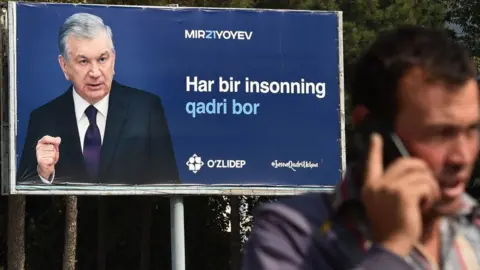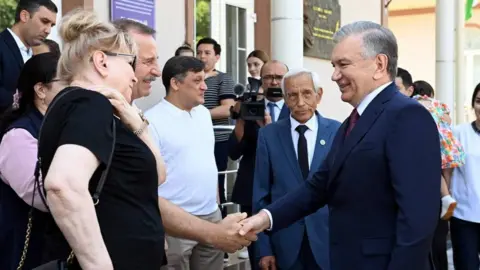Shavkat Mirziyoyev: Why is reformist Uzbek leader arresting bloggers?
 Getty Images
Getty ImagesOlimjon Haydarov was detained and taken into custody in Uzbekistan's eastern city of Kokand in July, after being charged with extortion.
The YouTuber, whose videos focus on various social and economic issues, was charged with taking money from managers of a shopping centre by threatening to write an article exposing safety breaches at the facility.
The regional police department said that he had been caught red-handed while taking a bribe from the victims.
Uzbekistan refers to both bloggers and citizen journalists as bloggers.
Mr Haydarov faces a jail term of up to 10 years if found guilty.
And he is not the only blogger being held.
Abduqodir Mominov was detained on 8 February, also charged with extortion. He was convicted on 4 August and sentenced to seven years in prison.
And in January this year, Khurshid Daliyev, the founder of the popular news outlet Human.uz, its chief editor Muslim Mirzajonov and several other journalists were detained after an office raid.
Uzbekistan's State Security Service, which is their national intelligence agency, later said that employees of the website were charged with blackmail and extortion. Their trials are being held in secret.
An alarming erosion
Critics say these crackdowns have damaged Uzbekistan's President Shavkat Mirziyoyev's image as a reformer.
Since coming into power, he has made significant headways in curbing child and forced labour, opening up the economy to foreign investment.
But his promise to bring in an era of free speech is in doubt.
Mr Mirziyoyev came into power in 2016, with an election campaign that relied heavily on both bloggers and social media.
On his campaign trail, he was constantly accompanied by a large group of bloggers.
 Reuters
ReutersAt the beginning of his rule he endorsed a bolder, freer media.
But as the 66-year-old sets out on his third term in office, the recent string of arrests have stirred concerns.
A number of Uzbek political commentators, writers and journalists have spoken in defence of Haydarov and others.
Ex-MP and public activist Rasul Kusherbayev said that he knew Haydarov personally and did not believe the charges against him.
"The criminal allegations against Olimjon are simply a hypothesis of a law enforcement body. Only time will show what actually happened, that is if we survive until that time comes and transparency is still there," Kusharbayev said.
"Activists are worried about various charges being brought against such individuals who actively use their right to free speech. Democracy cannot exist without this stratum of people who exercise freedom of speech and thought."
Sliding back to its Soviet past?
Over the last few years, civil journalists have played a crucial role in Uzbekistan in pushing the boundaries of the limited media freedoms allowed by President Mirziyoyev's government.
Though authorities did keep tabs on outspoken bloggers and arrested several social media figures - this was not widely perceived as a full-fledged crackdown on media freedoms, with many civil journalists continuing to voice the hope that those would be isolated cases.
Social media platforms such as Facebook, YouTube and Telegram also became focal points where Uzbeks were able to freely discuss and criticise policies.
This allowed bloggers like Haydarov to lead the public debate on thorny issues like corruption and nepotism in government bodies. Civil journalists, many of whom are also influencers, activists and political scientists, gained large followings.
But the latest arrests seem to have brought the realisation that authorities are truly on course to curb free speech.
Civil journalists have been increasingly vocal of late about the president's failure to honour his promises, the stagnating economic reforms as well as growing oligarchy and nepotism.
Prominent political analyst Kamoliddin Rabbimov suggests that Haydarov's arrest is the latest "alarming signal" for civil society, warning that the arrests could prove a costly mistake and ruin Uzbekistan's efforts to improve its international image.
"In our country, where legal statehood has not yet been established and political pluralism has not been formed, it is possible to easily prove accusations against any blogger or journalist. But on the other hand, there is such a factor as the internal and external reputation of countries in the world," Mr Rabbimov said in an article posted on Kun.uz.
Mr Rabbimov believes that the Uzbek law-enforcement system had started sliding back into its Soviet past, with the security services now using the same methods as the Soviet KGB.
"We remember that we lived in a country where the NKVD [Soviet Union's secret police] and the KGB repressed the people… The spirit of the NKVD is alive. And attempts to revive it are very strong. If this institution gets restored, no one will be spared."
